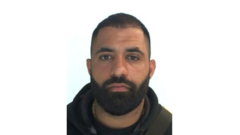In a move critics see as an attempt to silence dissent, Turkish authorities have blocked the X account of opposition leader Ekrem Imamoglu, who remains imprisoned and is unable to communicate with his followers. His supporters claim the legal maneuvers are politically motivated as they rally for his freedom.
Turkish Authorities Block Social Media Access for Jailed Opposition Leader

Turkish Authorities Block Social Media Access for Jailed Opposition Leader
The crackdown on Ekrem Imamoglu, Istanbul's jailed mayor and Erdogan's chief rival, intensifies as his social media account is blocked in Turkey.
Istanbul's hard-line authorities have escalated their crackdown on dissent following the blocking of Ekrem Imamoglu’s social media account, effectively silencing the jailed mayor’s communication with an audience of 9.7 million followers on the platform X. Imamoglu, a significant challenger to President Recep Tayyip Erdogan, is currently incarcerated under corruption allegations that he denies.
Commentators and supporters argue that the blocking of Imamoglu’s account is a deliberate move to erase his presence from public discourse. His Republican People’s Party (CHP) highlighted the action as a continuation of political oppression, describing it as a "coup attempt" aimed at undermining democratic processes ahead of upcoming elections.
The mayor had been leveraging social media to maintain visibility while incarcerated, communicating through his lawyers. Following the blockage, his account is still accessible internationally but not within Turkey unless users resort to virtual private networks (VPNs).
This crackdown unfolds alongside ongoing investigations by Istanbul prosecutors into posts made by Imamoglu that are perceived as incitement. Defending the legal actions, the government argues that these moves are grounded in judicial independence, even as human rights watchers contend that the judiciary is being weaponized against opponents.
Imamoglu has remained a focal point for protest efforts, calling supporters to action even while in jail. Following his arrest in March—which ignited widescale protests against the government—his supporters have organized significant demonstrations across Turkey, although attendance has dwindled in recent weeks. The opposition contends the charges against him mask a broader pattern of silencing dissent in a rapidly deteriorating democratic landscape.






















